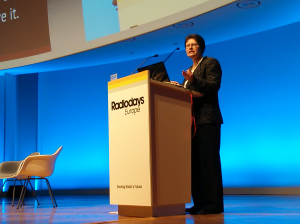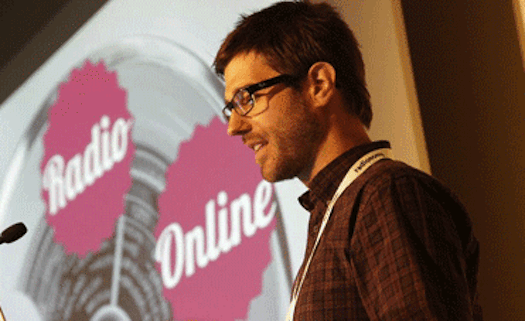James O’Brien reports from RadioDays Berlin.
There was a terrific response in the room to the talk given by fellow Australian, Sam Cavanagh (pictured above). Sam is the Executive Producer of the Hamish & Andy Show. At the heart of his talk was an idea around how the program team treated their audience. As he spoke, with a great deal of passion, there was a real sense of excitement in the room around the idea of seeing your audience as “fans”, not “listeners.”
Many radio stations, he argued, saw their audience merely as “listeners”, whereas the Hamish & Andy Show came from the approach of seeing their audience as “fans”. Once you see your audience in that way, he argued, you can actually get closer to them, as they become more involved in what you do.
He gave examples of where the audience came along for some wonderful promotions, including one where Hamish & Andy attended something like forty family parties (from babies to adults, from christenings to “How To Host A Murder” parties), and one where they brought out Sylvester Stalone’s brother (who was a singer in the 1970s) to tour. Sam explained “we could have made it free, but we charged everyone a token amount, five bucks, so they felt like they had an investment in it”.
 On a totally different level, I was completely blown away by the talk given by Susan Marjetti (right) from the Canadian Broadcasting Corporation.
On a totally different level, I was completely blown away by the talk given by Susan Marjetti (right) from the Canadian Broadcasting Corporation.
As the manager of the local talk radio station in Toronto (probably one of the world’s most culturally diverse communities), she explained how she and her team transformed their radio station over the last decade.
Like a lot of public service broadcasters in a similar position, the on-air line-up and listenership of the radio station remained older, mostly male, and mostly caucasian.
Their goal was to transform their radio station into something which more closely resembled the city in which they were based. It wasn’t anything about being “politically correct” or anything like that, she argued, saying there was a strong business case about meeting one of the public service goals of the public broadcaster (to broadcast to all Canadians), and about growing their audience in the future. “If we don’t get this right, we’ll be a precious emblem to a dying elite”, one of her colleagues said to her.
When they began transforming their on-air line-up (including regular guests) with a younger, more culturally diverse people this initially led a fall in ratings. But within twelve months, they went from sixth place in the ratings to number one, and they’ve been number one for fifty surveys in a row, she explained proudly.
When it came to the discussion about digital radio, including DAB+, I admit, I had mixed feelings. At times I was inspired, other times I felt a little sad. Sometimes I felt it was almost as if the industry I’ve loved all of my life was “begging” for its future survival. I sometimes felt as though we were “pleading” with the public, government and manufacturers to convert to digital radio to ensure our industry can survive, as more and more people use smart phones, computers, televisions and so on, to access our content. I feel like we need to stop saying “it’s better quality sound” and emphasising all of the technical reasons why we should switch to digital and spend more and more time saying, “hey we’ve got the best damn radio you’ll ever hear”, emphasising how great the content is, and can be.
On the positive, there was good news about the future of digital radio in cars (two more manufacturers announced digital radio as standard in new vehicles), and about high digital radio penetration rates in a number of countries. On the negative, I noticed how high digital radio penetration rates were in many parts of Europe (ninety percent of the population of Germany can listen to digital radio) compared with Australia where it remains limited to five capital cities (with trials only in Canberra and Darwin).
In Norway and Denmark they have firm plans for switching off their analogue radio network, and in the UK, one of the speakers mentioned a likely announcement towards the end of the year. I was particularly interested in the discussion about the analogue switch-off in Norway, as, like Australia, the geography of the country (mountains) and the low population density (isolation), significantly increases the challenges involved.
James O’Brien chats to Sam Cavanagh and others at RadioDays
James O’Brien works for ABC Radio and travelled to RadioDays in a private capacity.
This article was originally posted on his blog and is republished with his permission.
He will file more reports from RadioDays for radioinfo.
O’Brien also made his own presentation at the RadioDays Conference. Here are some highlights of his talk on pop up radio stations:
I’d like to begin by asking you think for a moment about the reason why you got involved in radio in the first place. Maybe you were like me? One of those kids who from the age of two or three was running you own radio station at home. If you might imagine for a moment one of my earliest childhood memories waz sitting behind the big old fashioned radio we had in the lounge-room, and pretending to be a radio announcer…
As we take our hobbies and turn them into careers, we can we sometimes lose track of the reasons why I think most of us in the room got involved in radio in the first place – and that is to satisfy our own CREATIVE DESIRES, and to provide the audience with something that’s so incredibly good, and they can’t get anywhere else…
With extra bandwidth and spectrum (thanks to digital radio and streaming) we now have the room to do something extra, something a little more creative than simply purchase and broadcast an off-the-shelf music library. I think there’s room for us all to delve into our own personal creativity, and that of our colleagues, to offer something new and unique.
So I’d like to tell you about something we’ve done in Australia which is called ABC Extra, which I hope might provide some inspiration for when you go back home…
The word of the year is definitely “pop up” – pop up shops, pop up galleries, pop up restaurants, and so on, and ABC Extra is a pop-up station. I’d estimate it’s operational for about half the year, and the rest of the time it’s dead. But when it’s up and running, the ABC is using ABC Extra to push the creative boundaries of radio, and hopefully connect with our audiences, and with new audiences, in ways we can’t otherwise do with our mainstream local and national networks. You know how sometimes you have a great idea, but then reality sets in, or your manager says “no”, and suddenly you realise there’s no airtime available for your great idea? Well, that’s what ABC Extra is all about.
He then went on to outline the success of various pop up ABC Extra stations, including the Coming Out Show, Lunar New Year, Jimmy LIttle, Back to Vinyl and other formats. Read his full presentation here.

